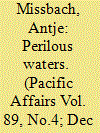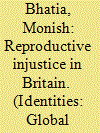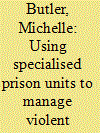|
|
|
Sort Order |
|
|
|
Items / Page
|
|
|
|
|
|
|
| Srl | Item |
| 1 |
ID:
158299


|
|
|
| 2 |
ID:
097861


|
|
|
| 3 |
ID:
149170


|
|
|
|
|
| Summary/Abstract |
Recent research has found that since 2001 a disproportionate number of Indonesian offenders sentenced to jail for people smuggling, both in Indonesia and Australia, are fishermen from Eastern Indonesia, the poorest part of the country.2 Based on three field trips to the Eastern Indonesian island of Rote, a frequent departure point for asylum seekers to Australia, and semi-structured interviews, this article investigates the socio-economic backgrounds of sentenced offenders from this area to explain their high numbers amongst imprisoned people smugglers. Through the narratives of fishermen who have been involved in the transport of asylum seekers, this article seeks to reconstruct their decision-making and risk-taking strategies in light of their generally precarious lives. Their motivations to become involved in people issue_images_89_4_missbach_rote-island-2smuggling are correlated with two structural problems they face, overfishing and pollution, which have exacerbated their economic situation over the last years. Understanding the local structural constraints of these impoverished fishermen helps provide a clearer understanding of why and how transnational people-smuggling networks succeed in recruiting them. Rather than viewing the decision to become involved in people smuggling as an individual’s poor judgement and its negative outcome as self-inflicted misery, this article stresses the notion of collective hyper-precariousness, which is enhanced by extrinsic factors such as Australian policies that have further limited the meagre choices for making a living legally on Rote
|
|
|
|
|
|
|
|
|
|
|
|
|
|
|
|
| 4 |
ID:
190764


|
|
|
|
|
| Summary/Abstract |
This article aims to show how race, gender, class, and other identity markers intersect to oppress, control and discipline poor and illegalized single migrant mothers and pregnant women from the Global South. The article draws on evidence from three ethnographic studies conducted between 2008 and 2017 to shed light on the predicaments of mothers and pregnant women excluded from the welfare safety-net, who were flying under the radar due to the fear of deportation. It shows how (cr)immigration controls render women vulnerable to victimization and harm. The second part of the article addresses imprisonment and punishment, treatment by the criminal justice system, and separation from children placed in foster care. The evidence strongly suggests that controls in Britain disrupt the core principles of reproductive justice, including reproductive autonomy and health, and to parent children in a safe and healthy environment without fear of retaliation from the government. This is being termed as racist-gendered state violence.
|
|
|
|
|
|
|
|
|
|
|
|
|
|
|
|
| 5 |
ID:
172190


|
|
|
|
|
| Summary/Abstract |
The use of specialised prison units (SPUs) as a means of countering violent extremism and radicalisation is growing in popularity in many jurisdictions. Yet, little is known about their ability to prevent radicalisation in the long term, limit the spread of violent extremism, or promote de-radicalisation and disengagement. This paper begins to explore these issues by reflecting on the over 40 years of experience that Northern Ireland (NI) has had in this area. It is argued that the international community tends to have an incomplete understanding of: a) why SPUs were created and installed in NI; b) how their regime, conditions, and underlying rationale changed over time; and c) the long-term consequences that SPUs have had on the spread of violent extremism, de-radicalisation, and disengagement. This paper seeks to make an original contribution to this literature by highlighting the role psychological, situational, social, and political factors played in shaping the effectiveness of SPUs in NI. By providing a more in-depth analysis of why SPUs in NI entrenched extremism rather than promoted disengagement or de-radicalisation, other jurisdictions will be encouraged to reflect on how these factors may affect the success of their own SPUs in countering violent extremism.
|
|
|
|
|
|
|
|
|
|
|
|
|
|
|
|
|
|
|
|
|